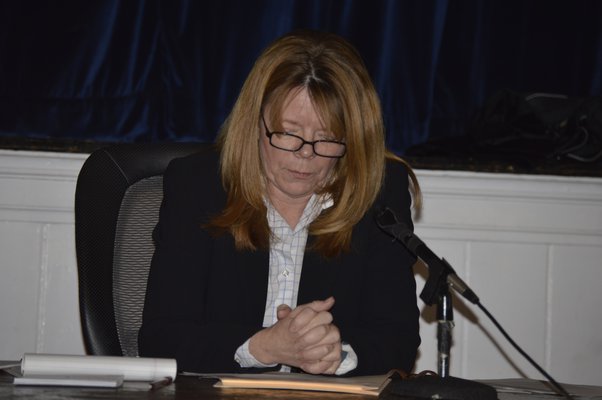
Environmentalists, local officials and residents who live near a sand mine in Noyac came down hard on the State Department of Environmental Conservation at a public hearing on Wednesday, November 19, urging the department not only to require an environmental review of an application to expand the mine but to reject the application entirely, as the mine sits above one of Suffolk County’s deepest aquifers.
In July, the DEC determined that the proposed expansion of the mine, known locally as “Sand Land,” would have no adverse environmental effects. That determination allows Wainscott Sand & Gravel Inc.—the company that is seeking to expand the sand mine, located off Middle Line Highway—to bypass an expensive and time-consuming environmental review. The November 19 public hearing came in response to a number of complaints the DEC received after it made its determination.
Wainscott Sand & Gravel is seeking permission to expand its operations by 4.9 acres, and also to excavate 40 feet deeper than authorized under its existing state Mined Lands Reclamation Act permit, which was issued by the DEC on November 5, 2013, and expires November 4, 2018. The company must secure approval from the DEC to modify the earlier permit.
Sand Land is currently mining 50 acres, and the excavated area now extends about 65 feet below its original grade. The mine has been permitted by the DEC and in operation since 1981.
Many who attended the hearing at the Bridgehampton Community House told DEC Administrative Law Judge Molly T. McBride, who presided, that the expansion would compromise the quality of drinking water that comes from the aquifer, the bulk of which is supplied to eastern Southampton and western East Hampton towns.
Because of that, Southampton Town Supervisor Anna Throne-Holst said Sand Land should be subject to the same water monitoring protocols the town requires of The Bridge golf club, one of the mine’s neighbors, which also sits on the aquifer. An environmental impact statement was required when the golf club, which has 16 test wells to monitor drinking water, was established in the 1990s.
“Because of the sensitivity of this area, because everyone is dependent on the water quality here, this should be put through all the stringent environmental protocols. We require that at the golf course,” Ms. Throne-Holst said at the hearing, adding that “there should be absolutely no reason why something like this, that is of a whole different magnitude,” wouldn’t be required to go through the same level of review.
Environmentalists agreed. Robert DeLuca, president of the Group for the East End, Adrienne Esposito, executive director of Citizens Campaign for the Environment, and Kevin McAllister, former Peconic Baykeeper and founder of the group Defend H2O, all told Ms. McBride that expanding the mine would have a tremendous negative effect on the ground and drinking water supply, mainly due to mulching and composting activities at the site.
In 2012, the Southampton Town Zoning Board of Appeals ruled that those activities were outside the scope permitted at the site, but a Suffolk County Supreme Court justice overturned that ruling in February, allowing Sand Land to continue to process and sell mulch.
“Mulching and compost operations cause groundwater contamination, manganese … radioactivity and heavy metals,” Ms. Esposito said. “We need to assess the truth here. We believe the DEC will find the groundwater is contaminated.”
Robert Rubin, owner of The Bridge, said the mine also disrupts the neighborhood. He estimated that during the spring, some 350 trucks enter and leave the site, bringing loud noise and lots of dust in addition to foul smells from the composting.
State Assemblyman Fred W. Thiele Jr. spoke of Suffolk County’s water quality issue as a whole, explaining that in light of its decline, the DEC especially should be taking every step possible to ensure that one of the county’s largest aquifers be protected from contamination. “I’m not an environmental expert, but I can look at the grade of the mine—and this grade gets an F,” he said.
Residents who live near the mine raised the same concerns, and some sent a lawyer to speak on their behalf. Zachary Murdock, a Melville-based attorney who has represented three households immediately to the south of the mine since 2005, described the site as “a theme park for contractors.”
Neither the DEC nor John Tintle, president of Wainscott Sand & Gravel, made any comments throughout the two-hour hearing, except to summarize what the expansion project would entail.
As of this week, a DEC spokesperson could not provide a date for when the department would make a determination on the application to expand the mine, or say whether the DEC would reconsider its determination that an environmental impact statement is not required.